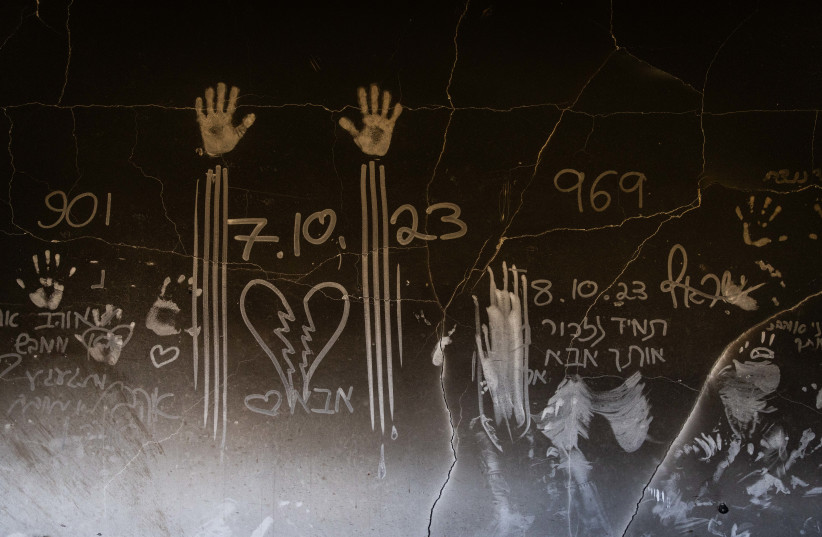In the days after October 7, many observers stated how the horrendous weekend invasion by Hamas that scorched the country’s South with carnage was akin to Israel’s 9/11. A before and after reality that forever alters history.
That’s certainly spot-on, but the closest parallel I found to the emotional impact of the cataclysmic changes to the landscape in the country that October 7 thrust upon Israel is the assassination of prime minister Yitzhak Rabin in 1995.
That’s probably because for both life-altering events, I was working at The Jerusalem Post as a night editor. The similarities in the circumstances were eerie.
Both were Saturday night shifts originally expected to be quiet, methodical evenings trying to piece together mostly uneventful news that occurred over the weekend, or in the case of October 7, the Simchat Torah holiday.
Instead, they both turned into mind-boggling, tense, breathless decision-making, snap edits, headline writing, design deliberations, and production, all conducted like sprinting throughout a marathon.

One of the necessary traits that journalists are supposed to possess is the ability to set aside personal feelings and get the job done, like an automaton. On the night of the Rabin assassination, it wasn’t only necessary; it was a coping mechanism for survival and prevention of total collapse.
The frantic flow of information, the constant calls from reporters asking what they should do, and the tearing up of completed pages to make room for the horrendous news made the handful of hours between the reports of the first shots and the closing of the paper a breathless blur.
Only after the paper went to bed did the deep breathing begin, and the tears started to flow. The following morning, waking from what seemed to be a bad dream but was instead a harrowing reality, the pervading feeling was hopelessness and helplessness.
There didn’t seem to be any way back from the deep, dark hole we had fallen into. I lay in bed and put the cover over my head, wanting it all to stop. But there was another paper to print. So I went to work and did the whole thing over again.
Fast forward 28 years later
Fast forward almost 28 years later, and the exact same sense of despair returned. That Saturday night of October 7 was even more traumatic.
Having known since early in the morning that a catastrophe of unknown proportions had taken place, I, like much of the country, was glued to the updates emerging from the South all day. By the time I arrived at the Post as Simchat Torah was ending, my stomach was tied in knots.
Like Rabin’s assassination, that Saturday night’s shift was another breathless marathon, as a small group of dedicated individuals attempted to create a cohesive narrative of the dozens of moving pieces that made up the unbelievable events that began that morning at 6:30 a.m., all within the drastic deadline constraints.
As I was perusing our photo services, looking for the visuals to accompany the stories, the graphic images were like a car crash magnet that one couldn’t avoid staring at. The lifeless, bloodied bodies of Israelis slumped in cars who had been gunned down on the road by Hamas terrorists and the shots of other victims thrown onto trucks like cattle and brought back to Gaza seemed like images from a horror movie, not the reality that had befallen Israel.
Although there was no way those gruesome photos would get into the paper, they served the purpose of bringing into focus the enormity of the events that had unfolded.
The stories from our dedicated writers, many of whom only became really aware of the scope of the disaster once the holiday was out, dripped into the email system, each one like another dagger piercing the heart and making anyone who read it desperate to cry out in anguish.
But, like in 1995, the paper had to come out, and emotions had to be submerged behind a façade of professionalism. And again, like 28 years before, when the last page was finally sent to print late at night, there was deep breathing and a swirl of emotions.
But there were no tears this time, just emptiness and thoughts of the hundreds of Israelis captured and forced into Gaza and what their families must be going through.
The tears only came the next morning on October 8, when driving on the usually packed but now nearly deserted Road 1 in Jerusalem, Reshet Bet’s morning show broke into announcer Alon Velan stoically reciting the names and towns of the 26 young soldiers killed on the first day of the war. Most were 19 or 20, only at the beginning of their life’s journey, and it was too much to bear.
I didn’t want to go to work. I wanted to crawl back under the covers like after Rabin’s assassination and hide. That feeling has re-emerged many times since then, as the remaining hostages languish in Gaza and hundreds more soldiers have fallen in battle. As the events over Rosh Hashanah attest to – Iran once again targeting Israel with ballistic missiles, a horrendous Palestinian terror attack in Jaffa, a regional war taking shape in Lebanon – there seems to be no slowing down in the events that shape our reality and our future.
Like the rest of the country, the events of the last year have irrevocably altered my own reality. My family has been torn apart, with children fleeing the country for safer environs, others being forced to evacuate a bucolic existence in the North, and others spending multiple months in reserves, as thousands of Israelis have done.
But the events of October 8 and of every day in this horrible year since then have forced me out of bed and to the job at hand of sitting down at the keyboard and trying to make sense of something that makes no sense at all. Otherwise, the days would be too dark to bear.
